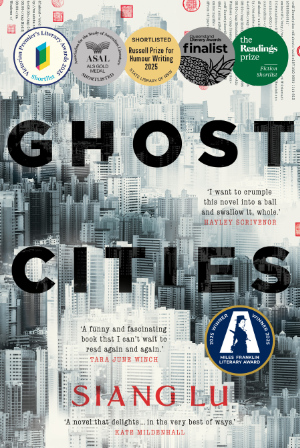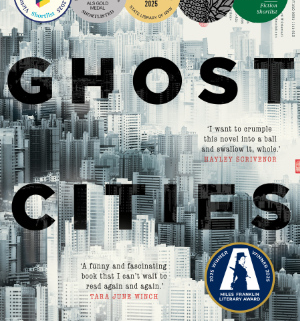Ghost Cities
 Ghost Cities
Ghost Cities
Siang Lu
University of Queensland Press
Reviewed by Wendy Tucker
Lu’s Ghost Cities just won the Miles Franklin award, certainly the most lucrative and probably the most prestigious literary prize in Australia. This was a bold, risky and brave choice because there is nothing safe about this novel. It is savage in its satire, hilarious in its observance of absurdity and, yet, surprisingly moving. It is also impossible to slot it into any definable genre.
Our protagonist is a young Chinese Australian man, Xiang, who has just lost his job as a translator with the Chinese Consulate when it was discovered that he doesn’t actually speak any Mandarin but relied on Google translate.
When this goes viral on social media, Xiang gains fame and the hashtag #badchinese. He is courted and then employed by an eccentric Chinese film director, Baby Bao. Bao is making a 24/7 film using citizen actors in the one of the ghost cities. Ghost cities are fully functional cities built in China to house agricultural workers. Absurdly, this flow of population never happened, and the cities remain empty, most often used only as film sets.
Flowing in and out of this contemporary narrative are ancient and mystic stories and fables. One of these is of an ancient emperor who in his paranoia, creates a thousand doubles of himself, sends his advisors and brothers to the Imperial prison called Six Levels of Hell, builds a labyrinth of amazing complexity under his palace and burns all books. His favourite concubine hides in the labyrinth recreating books from memory. There is also the perspective of people surrounding the absurd emperor who end up dead for creating art that is too beautiful.
There is the narrative of a village, known as ‘the armpit of the armpit’ where a mountain becomes sentinel, a lake hides an ancient temple and a sculptor creates a garden of stone.
The times and the characters interact and surprise the reader in this seemingly bonkers mixture of wonder, wisdom and fascinating storytelling.
This novel shouldn’t work, but it does, due to the superb intelligence of the writing, the biting satire and the theme that art and love continue to survive absurdity and madness in times both contemporary and ancient.


